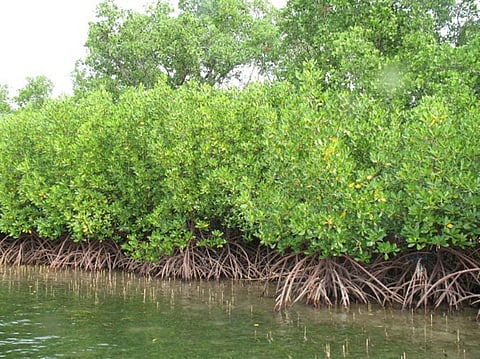

BHUBANESWAR: In a first-ever genome sequencing for any mangrove species, a group of researchers has sequenced the genome of one of the highly salt-tolerant mangrove species Avicennia marina found in all mangrove formations across the country.
Avicennia marina (gray mangrove) is a salt-secreting and extraordinarily salt-tolerant mangrove species that grows optimally in 75% seawater and tolerates 250% seawater.
The research group at the Institute of Life Sciences (ILS), Bhubaneswar, and SRM Institute of Science and Technology, Tamil Nadu has sequenced nearly 99% of the genome of the species and aligned them to 31 chromosomes of the species.
The study published in the recent issue of the Communications Biology (a nature group of journal) revealed the assemblage of a 456.6 Mb of the estimated 462.7 Mb A marina genome (98.7% genome coverage) in 31 chromosomes derived from 88 scaffolds and 252 contigs.
ILS Director Dr Ajay Parida said the percentage of genomes in gaps was negligible, thereby proving it to be a high-level genome assembly for the species.
“Avicennia marina is among the rare plant species, which can excrete 40 pc of the salt through the salt glands in the leaves, besides its extraordinary capacity to exclude salt entry to the roots. Understanding the genetic basis of salt tolerance in the species is significant for the identification of salinity tolerant genes,” he said.
The study employing the latest genome sequencing and assembling technologies has identified 31,477 protein-coding genes and a ‘salinome’ consisting of 3,246 salinity-responsive genes and homologs of 614 experimentally validated salinity tolerance genes.
“As many as 614 genes, including 159 transcription factors, which are homologous to the genes, were identified. The genes have been functionally validated for salinity tolerance in transgenic systems. The availability of the genome sequence of mangrove species will trigger a wide range of molecular studies not only in India but across the globe,” said Dr Parida.
The study assumed significance as agriculture productivity globally is affected due to abiotic stress factors such as limited water availability and salinisation of soil and water. Availability of water is a significant challenge to crop production in dry-land areas, accounting for 40% of the world’s total land area.
Salinity is prevalent in 900 million hectare globally (with an estimated 6.73 million ha in India) and it is estimated to cause an annual loss of 27 billion USD.
“The genomic resources generated in the study will pave the way for researchers to study the potential of the identified genes for developing drought and salinity tolerant varieties of important crop species of the coastal region that is significant for India with 7,500 km of coastline and two major island systems,” added Dr Parida.
The research team of SRM Institute of Science and Technology led by Dr M Parani also contributed significantly to the study.